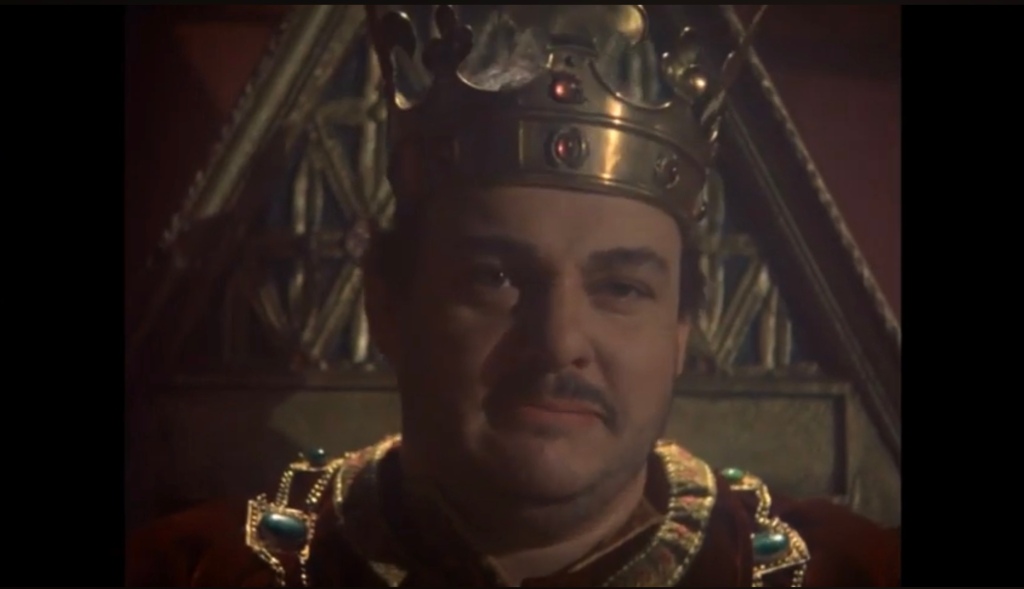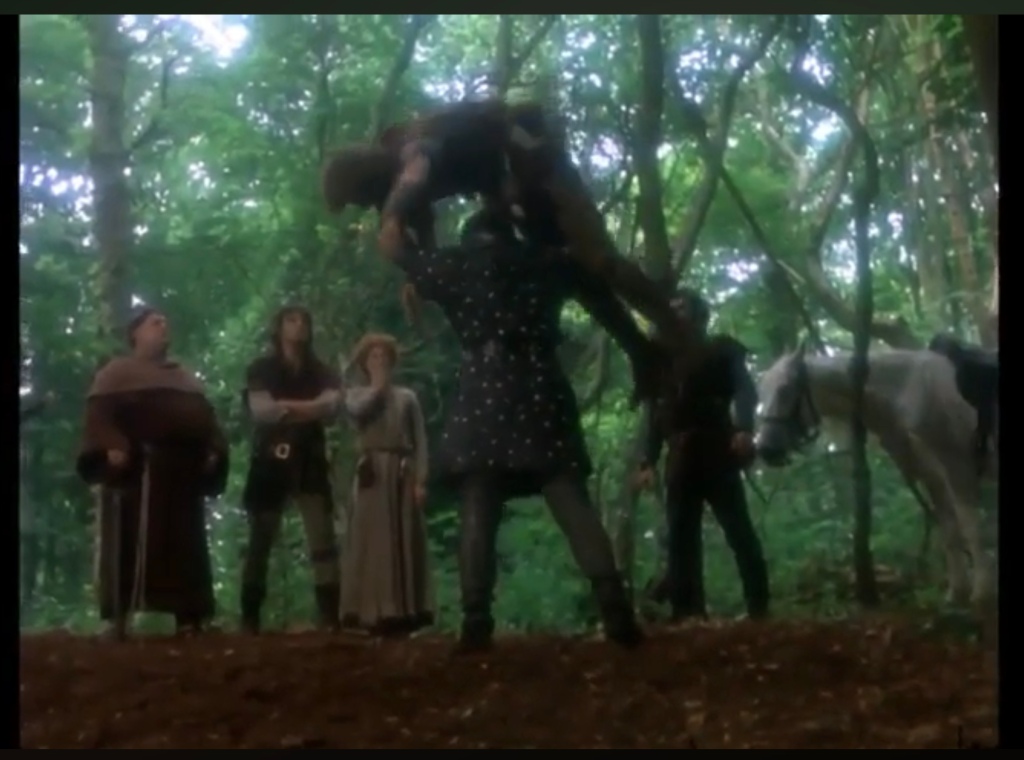
This post is my contribution to the 10th annual Favourite TV Episodes Blogathon run by Terence Towles Canote over at A Shroud of Thoughts. To mark the 40th anniversary of Robin of Sherwood I’ve chosen The King’s Fool, the final episode in series 1, which subverts the traditional telling of the encounter between Robin Hood (Michael Praed) and Richard the Lionheart (John Rhys-Davies) in Sherwood Forest.
Robin of Sherwood was created by writer Richard Carpenter (Catweazle, Adventures of Black Beauty), in collaboration with producers Paul Knight and Patrick Dromgoole. They had all worked together before. Knight and Carpenter enjoyed huge success with Dick Turpin (1979-82) before reuniting for the Oliver Tobias vehicle Smuggler (1981). Dromgoole had produced Arthur of the Britons (1972-73) (also starring Tobias) and an adaptation of Robert Louis Stevenson’s novel Kidnapped (1978) for the ITV regional network HTV, before joining Carpenter and Knight on Smuggler.
Carpenter reworked the legend of Robin Hood adding an element of supernatural folklore into the story. The entire first season of Robin of Sherwood was helmed by Ian Sharp (Who Dares Wins) and it mixes the authentic feel of Richard Lester’s Robin and Marian (1976) with the mysticism of John Boorman’s Excalibur (1981). The haunting soundtrack by Irish band Clannad added to this otherworldly air. Most notable was the addition of a Saracen companion, Nasir (Mark Ryan), who was only supposed to be in the first episode but proved such a compelling figure he was added to the group.

The two-part opener Robin Hood and the Sorcerer brought all the outlaws together. Carpenter wanted to cast young actors, pointing out revolutions are usually fuelled by youthful rebellion. Praed starred as Robin of Loxley (later replaced by Jason Connery’s Robert of Huntingdon), Judi Trott as Maid Marian, Clive Mantle as Little John, Phil Rose as Tuck and Peter Llewelyn Williams as Mutch. The most experienced cast member was Ray Winstone (Quadrophenia, Scum) as the volatile Will Scarlet. Martin only appeared in the first season and Martin West, the actor who played him only has one other screen credit, an episode of Stacy Keach’s Mike Hammer series.
Carpenter’s writing on Dick Turpin and Smuggler had an anti-authoritarian streak and this continues in Robin of Sherwood. In The King’s Fool he delivers a cynical reworking of the legend of King Richard disguising himself and travelling into Sherwood to find Robin Hood. The episode opens with a lone knight riding on horseback through Sherwood Forest. Bandits ambush the knight and drag him from his horse overpowering him before he can fight back. As their leader draws his knife and moves in for the kill he is felled by an arrow fired by Robin. “So you fight among yourselves?” says the knight as his tormenters flee. He bristles when Robin says he’s defending the people of Sherwood. “You talk as if they belong to you.” “No man belongs to another” answers Robin using Nasir as an example. “Try buying him with a thousand horses.”
There’s an obvious clash between social hierarchies here but something else is going on. Surprised when the outlaws offer him hospitality the Knight is watchful as they eat together. He listens as they talk about the problems facing the poor and the abuses dished out by the nobility. He offers a toast to King Richard which stuns his hosts. Only Robin raises his drink in acceptance. “When King Richard returns…” says the Knight, “pigs will fly,” interrupts Will, and Little John lists all the reasons nobody in England wants Lionheart back.
“It’s time to pay us Sir Knight.” They do after all rob the rich to feed the poor, but the Knight offers them a deal. A wrestling match for his horse. If he wins, he rides out of the forest. It’s an even contest until the Knight in an incredible display of physical strength picks up Little John and holds him over his head before throwing him to the ground. “Who are you?” asks Robin. A punch floors him before the answer arrives. “Lionheart!”

As in the old tales Robin and his followers kneel to the King, expecting the worst as they are surrounded by soldiers. “Yes, I was hunting. Hunting a young wolfshead called Robin Hood.” All over Europe he heard the stories of Robin Hood and his battles with the Sheriff. “God’s legs, you’re a wild lad Robin, but you saved your King, and that wipes the slate clean.” The King offers them all a pardon should they visit him in Nottingham that night. Will, an embittered Saxon who hates the Normans, is more suspicious. “What if he changes his mind? I trust very few people and I’m looking at all of them.” He resolves to stay in the forest.
Will’s fears seem to be confirmed when the outlaws are confronted by Sir Guy of Gisborne (Robert Addie) and arrested as they enter Nottingham. Gisborne does not know about the pardon though and is mocked by Richard when he parades the seven outlaws in front of the court at Nottingham Castle. “Did they intend to scale the castle walls and put us all to the sword? Or did they intend to surround us and lay siege to us?” It’s King Richard who is really doing the parading, showing off the outlaws under the roof of the sheriff and nobles who couldn’t catch them “With 200 men like these I could have taken Jerusalem.”
Robin tries to address the court about the plight of the poor but the King cuts him off in mid-sentence. “Well said, well said,” and encourages Robin to feast. The now deposed Sherriff (Nickolas Grace) watches on with his brother Abbot Hugo (Philip Jackson) as the outlaws drink themselves silly. “This is a deliberate humiliation.” Tuck knows the King is pulling rank and testing the loyalty of the nobility. “They’re all for Richard now,” despite them supporting Prince John a week ago. “They’ll buy their way back into favour.” The King’s adviser Hubert Walter (Gary Waldhorn) warns the King his plan to use Robin Hood may backfire. “The wolf has never served the lion.”

The morning after the feast and a hungover Robin Hood is asked to make a choice. A pardon in return for fighting alongside his King in Normandy. Robin accepts, but the others are not so sure. Marian in particular does not fancy waiting for Robin to return from a war, even if her family will have their lands returned to them. Much is sent to fetch Will from Sherwood, but he has been visited by Herne the Hunter (John Albineri) who sent him a message via an arrow fired inches from his head and into the tree he was sitting next to. “Beware the lion.” Will tells Much not to trust the King.
Back in Nottingham King Richard gathers all the nobles together. “Mercy must be paid for. So must power. So must privilege.” And he essentially auctions their positions to the highest bidder just as Tuck predicted. Afterwards the outlaws show off their skills at court. Little John fights a soldier with a quarterstaff, but he shrugs off the applause when he wins and knocks back the wine. The string on Robin’s bow breaks during an archery competition. “That was an omen” says Marian. She begs him not to go to Normandy. Nasir quietly slips away. John confronts Robin. “We’re his pets. The wolves clever King Richard trapped and tamed,” and he storms off dragging Martin with him.

Tuck has been watching the counsel. “The King put the sheriff back. I said he would.” On learning the King intends to raise money by taxing the poor Robin goes to speak to him but his protestations are ignored. “Shall I take away your sword and give you a pig’s bladder?” Having rehired the Sheriff, King Richard asks him to organise the murder of the remaining outlaws. Gisborne is sent to dispatch them, but of course botches the assassination. However, he mortally wounds Marian with an arrow as the outlaws flee the castle.
In the pre-credits sequence to the opening episode Robin’s father Ailric of Loxley (Wayne Michaels) is ambushed at a stone circle known as Rhiannon’s wheel and killed by the sheriff and his men after leading a rebellion against the Normans. The supernatural aspects of the show are introduced early on establishing Robin of Sherwood as a world where magic exists and prophecies can be fulfilled. Ailric is guarding a silver arrow belonging to Herne which seems to have mythical powers. As he lays dying Ailric mutters the words, “He is coming, the hooded man is coming.” When the Sheriff picks up the arrow it gleams unnaturally and thunder cracks in the sky.
The finale of The King’s Fool mirrors the opening by returning to Rhiannon’s Wheel, only this time it is Marian who is dying. Ailric hoped to find help from Herne the Hunter, the guardian of the forest. Now he has assumed the mantle the hooded man Robin is able to call on Herne, using his powers to heal Marian. “The wheel turns” and the world spins bringing back the errant outlaws, Little John, Nasir, Will, and Martin, as if they were all summoned to this place.

Robin of Sherwood felt like a culmination of the work done by Dromgoole, Knight, and Carpenter in their previous shows, plus the influences it took from more recent versions of the legend. Notably Wolfshead: Legend of Robin Hood (John Hough), a failed pilot for a TV series filmed in 1969 but later released in cinemas in 1973, and the BBC show The Legend of Robin Hood (1975) which both presented more grounded low-key versions of the story. Richard Lester’s elegiac Robin and Marian channels the same revisionist spirit American directors were bringing to the Western, with an ageing Robin (Sean Connery) returning after two decades fighting in the Holy Land but despite his best efforts unable to relive the glory days of his youth.
Goldcrest’s collapse in the mid-80s’ after the costly failures of Absolute Beginners (1986, Julien Temple) and Hugh Hudson’s Revolution (1985) meant the show was never finished although there was an attempt to revive it in the late 2000’s with the original cast and a new script by Richard Carpenter but ITV rejected it outright. The cast did return however for an audio drama Knights of the Apocalypse (2016) based on one of Carpenter’s unused scripts for the original show.